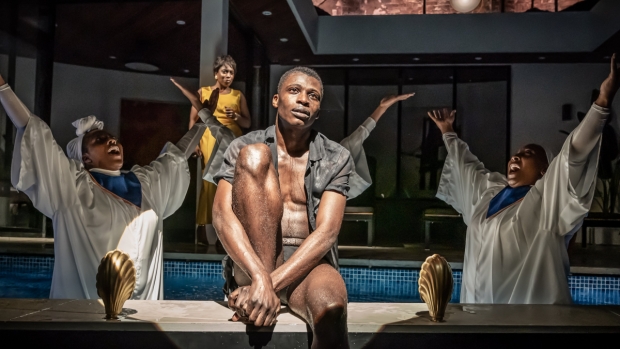"Daddy" – A Melodrama at the Almeida – review

© Marc Brenner
There's such excitement surrounding the American playwright Jeremy O Harris. His Slave Play, in which the attitudes of the American Civil War became role play in a sex workshop, ignited Broadway,earning the most Tony nominations (12) of any straight play. His work on the film Zola and the super cool TV series Euphoria have increased the sense of dazzle.
It's a shame then that his first play to arrive in the UK is Daddy, written before Slave Play but produced after. For all its operatic staging and ambitious intent, this feels like a young man's work – full of wild energy and sharp writing, but not necessarily as rich as it initially appears.
It boasts an amazing setting. Matt Saunders, imported like the director Danya Taymor from the US production, has created a glistening, real swimming pool with glassy mansion behind and palm trees on the horizon. It's like stepping into a David Hockney painting of LA – deliberately so, because this is the height of the dreams of talented young artist Franklin (Terique Jarrett).
We first meet him, smiling with conspiratorial glee, emerging from that pool at the home of Andre (Claes Bang), an art collector who buys contemporary masterpieces by the yard (Twombly, Lichtenstein, Calder, Basquiat). "You have money, but the taste is like, booty," Franklin, observes, boldly.
Andre takes him under his wing, becoming not only Franklin's lover, but his "sugar despot", calling him his "little Naomi" after the super model Naomi Campbell, who once took a lap in the same pool. The dynamics of their relationship shift and muddy; there's a lot of nude coupling, a bit of slapping and spanking, a sense of underlying, uneasy threat. Franklin calls Andre Daddy, and his two airhead friends – lively performances from John McCrea and Ioanna Kimbook – are overwhelmed by the sudden largesse on offer, and worried that Andre's presence is distorting Franklin's success as an artist.
Then Franklin's bible-thumping mother Zora turns up, and the play becomes a battle for his soul, with Zora's scriptural sense and belief that the pain a Black mother experiences bringing up a boy gives her special rights, pitted against Andre's devilish magnetism and Franklin's desperate desire to find the father missing from his childhood. Oh, and there's a gospel choir who punctuate the action like a Greek chorus, and a pretty ferocious satire of the art world, where Franklin succeeds by making misshapen soft-cloth figures that represent his inner feelings. Andre's, predictably, is white and does not have a face.
It's all presented with considerable panache, with Taymor's direction revelling in its bold effects – a karaoke rendition of George Michael's "Father Figure", the wedding breakfast from hell (evocatively lit by Isabella Byrd), the pool as a site for baptism and cleansing.
The performances too are engaging. Jarrett makes Franklin a wonderfully conflicted figure, both used and using, brave and terrified; his emotions flit across his face like words. Bang, on the other hand, conceals Andre's feelings; his motivation is never clear. There's a fine moment when they dance together, the disparity in their height making Franklin look exactly like one of his puppets.
As Zora, Sharlene Whyte cuts a magnificent swathe through the action, all expressive gestures and impassioned belief. And Jenny Rainsford contributes a brilliant cameo as Franklin's gallerist Alessia, prone to phrases such as "Patronage is nothing to be ashamed of."
Yet underneath all the glitzy, glamorous trappings, Daddy is a fairly simple story of a confused young man trying to work out the psycho dramas of his upbringing. It's brightly clever rather than illuminating. It subtitles itself a melodrama. Yet the point about melodramas – as the programme essay points out – is that they have a direct line to emotional truth. Daddy feels as if it has inverted commas around its pain.










